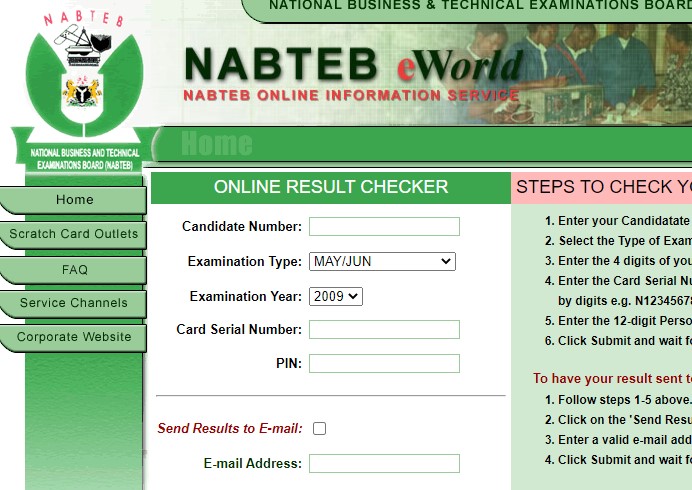NABTEB is an acronym that stands for the National Business and Technical Examinations Board. The Board is one of the many examination bodies set up by the Federal government of Nigeria in 1992 to reduce the bulk of responsibility saddled on the West African Examination Council (WAEC). It is charged with conducting technical and trade-related practical examinations.
Reliving WAEC of that duty, the body now has the responsibility to conduct the National Technical Examination (NTC), National Business Certificate (NBC) as well as their respective advance level examinations (ANBC and ANTC).
A Brief History Of NABTEB
NABTEB, as mentioned above, was established in 1992 to domesticate craft-level examinations that were previously conducted by the West African Examination Council (WAEC). The examination was also previously handled by City & Guilds, Pittman’s, and Royal Society of Arts – all UK based in accordance with the provisions of the National Policy on Education.
The establishment of NABTEB was the climax of an evolutionary process that spanned 15 years from 1977 to 1992, in which four different government panels were set up to review the place and structure of public examinations in the nation’s educational system at different times.
Each of these panels advocated and justified the multiplication of the examinations bodies, and in particular, a separate body to perform the functions which NABTEB now performs. The process began with the findings of Justice Sogbetun Commission of Enquiry (1978) which was set up in response to the public outcry on perceived inefficiency and unchecked leakages of public examinations.
This was followed by the Angulu Commission which was set up as a result of WAEC’s presentation to the House of Representative Committee on Education in 1981 in which WAEC advocated the setting up of other examination boards in Nigeria to reduce the burden on the commission.
The third was the Okoro Panel set up in 1989 to review the Angulu Report. The fourth and final one was Professor Akin Osiyale’s Task Force set up in 1991 to evolve a strategy to reduce the burden of WAEC and bring about greater efficiency in the conduct of public examinations.
The National Business and Technical Examinations Board (NABTEB) under Decree 70 of 1993, and other examinations bodies, were then established. Since its establishment, the findings of the Etsu Nupe Panel (1997) and the Shonekan Vision 2010 (1997) Report have supported NABTEB’s existence both directly and indirectly.
The National Headquarters of the Board is located at Ikpoba Hill, Benin City, Edo State.
NABTEB is charged with the following responsibility:
1. Conduct examinations leading to the award of the; National Technical Certificate (NTC) Advanced National Technical Certificate (ANTC) National Business Certificate (NBC) Advanced National Business Certificate (ANBC) and Modular Trade Certificate (MTC).
2. Take over the conduct of Technical and Business Examinations formerly conducted by the Royal Society of Arts of London, City and Guilds of London, and the West African Examinations Council; issue results, certificates, and make awards in examinations conducted by the Board.
3. Conduct other specified examinations on behalf of or in collaboration with other examination bodies or agencies such as Registration Form Exam, the London Chamber of Commerce, or the Institute of Chartered Accountants of Nigeria etc.
4. Conduct common entrance examinations into technical colleges and allied institutions; monitor, collect and keep records of continuous assessment in Technical Colleges and allied institutions towards the award of certificates in National Business and Technical Examinations.
5. Conduct research; publish statistics and other information in order to develop appropriate examinations, tests, and syllabi in technical and business studies.
6. Prepare and submit to the Secretary an annual report on standards of examinations and other related matters; carry out such other activities as are necessary or expedient for the full discharge of all or any of the functions conferred on it under the Decree.
How Effective Has NABTEB Been?
In its twenty-nine years of existence, NABTEB as a specialized examinations/assessment body has above all discharged the duty for which it was established. The board in 2021 stated that over 92% of candidates who sat for the examination scored five credits without Maths and English, which was a significant improvement compared to that of 2020.
In addition to the above-mentioned achievement, the body has also:
1. Become a member of the International Association for Education Assessment (IAEA) and Association for Education Assessment in Africa (AEAA).
2. Developed modular Curricular in Collaboration with the National Board for Technical Education (NBTE).
3. Built and acquired housing facilities for its operations nationwide e.g. the Board’s liaison office in Abuja and the headquarters Office Complex in Benin City, and in other major cities across the country
4. Improved staff training, development, and welfare.
5. The steady development of examination administration and the full computerization of its examination operations.

NABTEB Examinations – Who Are Qualified To Take Them?
With its certificate being listed by JAMB as a prerequisite for admission into tertiary institutions, enrollment has increased tremendously over the years. NABTEB conducts the National Technical Certificate (NTC) and National Business Certificate (NBC) examinations as well as the advanced level versions of the following trades/disciplines:
- General Education
- Business Trades
- Engineering/Construction Trades
- Miscellaneous Trades
The Modular Trades Certificate Examinations (MTCE)
The Modular Trades Certificate Examinations (MTCE) began in 2004. The MTCE is for persons who wish to acquire effective capacity in components of a trade like Motor Vehicle Mechanics Work Trade (steering and braking system mechanic work module) Catering Craft Trade (food preparation module); Secretarial Studies Trade (typewriting 35WPM for Typist II module); Book Keeping Trade (purchasing and supply module).
The Ordinary Level Examination (NABTEB O’ Level)
The Ordinary Level NABTEB (O’Level) is the type students use to combine with JAMB to gain admission into 100 level in universities. The O’Level NABTEB has the same authority as WAEC, NECO, and GCE variants.
The NABTEB O’Level is mostly popular among secondary school leavers who need to sit for another O-level examination in order to have their O’ Level courses complete. The registration of this examination can run between #13,000 to #35,000 depending on location and study centers.
NABTEB A’ Level Examinations (ANBC & ANTC)
NABTEB A-level exams is an advanced level of its O’Level and can only be taken by candidates who had earlier sat for and made their O’Level (NABTEB) examinations. NABTEB A-level caters to those who wish to gain admission into Nigerian universities but have not been able to do so through JAMB. NABTEB A’level is thus an alternative to JAMB.
When you attend lectures in any of the approved NABTEB A’level Centres and pass, you can combine the result with the Direct Entry form and use it to gain admission into the 200 level. Currently, not all universities accept NABTEB A’level. But, they all accept NABTEB O’level for 100 level admission.
To see the list of universities that accept NABTEB A’level for 200 level direct entry admission, click here. ANBC & ANTC certificates are equivalent to an OND and NCE. With NABTEB A’level Certificate, an applicant is placed on level 5 (especially in the civil service) in the Labour Market.
Can NABTEB Registration Be Done Offline?
NABTEB conducts examinations twice a year: May/June; November/December and registration for any of the categories is done online. The only offline part of the registration is the pre-registration part where the applicants are required to get NABTEB offline biometric data capture software after which they proceed to the board’s official website to begin the online registration.
Registration Requirements
- Registration Card/Pin
- Biometric Information
- Passport Photograph
Step By Step Procedure Of Registering For NABTEB
Step 1: Purchase of Registration Pin
The first step in registering for any of the NABTEB examinations is to purchase their pin and the pins can be purchased at any of the following offices:
- NABTEB Zonal Offices in Abuja, Kaduna, Yola, Osogbo, Enugu and Benin
City, - NABTEB Liaison Office in Abuja,
- NABTEB Area Office in Lagos,
- NABTEB State offices Nationwide and
- NABTEB National Headquarters, Ikpoba Hill, Benin City
Step 2: Capture Biometric Information
This is very important. Before proceeding to the website for your registration, you must first capture your biometric information (ie Right and Left Thumb) as the portal will not allow applicants to register online without first doing the biometric data capture.
NB: NABTEB Biometric Data Capture Application software can be gotten from the nearest NABTEB office nationwide. Applicants should also ensure that they supply their correct names and passport/registration card alongside PIN and SERIAL when doing the Biometric Data Capture.
Step 3: Proceed To The Board’s Website
After doing steps 1 & 2, applicants can now proceed to the board’s website at www.nabteb.gov.ng to begin the registration properly. On the website’s dashboard, scroll to the top right and click on examinations then scroll to select the type of examination you are registering for (May/June, Nov/Dec). Click on it and it takes you to another page where you see the “Start Here” button. Click on the button to be redirected to the registration page.
Step 4: Fill Out the Form
On the registration page, fill in the PIN and serial number gotten from the
purchased scratch card. Once you are logged in, fill out every other information required on the displayed form and submit.
NB: Ensure that your passport is 160px by 200px and size is less than 30kb
How To Check NABTEB Results
NABTEB results usually come out about three months after it was taken. What this means is that if you took the May/June version of the examination, you should be expecting your results by the end of September or early October.
Interestingly, the board has made checking the result easy either by logging on to the result checking portal via your email address or SMS. Below are the procedures to which the results can be checked.
Via The NABTEB Result Checker Portal
To check your result via the board’s result checker portal, take the following steps
- Purchase the result scratch card from any of the NABTEB zonal offices or any of the branch offices of Fountain Trust Bank Plc across Nigeria.
- Visit the portal – http://eworld.nabtebnigeria.org/
- Enter your Candidate Identification Number
- Select the Type of Examination (May/June; Nove/Dec)
- Enter the 4 digits of your Examination Year
- Enter the Card Serial Number found on the reverse side of your Scratch card. The Card Serial Number has an alphabet prefix followed by digits e.g. N123456789
- Enter the 12-digit Personal Identification Number (PIN) on your Scratch card
- Click Submit and wait for the results window to come up.
Via Email Address
You can also receive your result via your email address. All you need to do is to:
- Follow steps 1 to 5 above, then click on the “Send result to email” button
- Enter a valid e-mail address
- Click Submit and wait for the results window to come up

Via Mobile Phone/SMS
You can also have your result sent via SMS to your mobile phone by simply taking the following steps:
Send SMS in this format – NABTEB*ExamNo*PIN*ExamType*ExamYear – to short-code 32327. For example, to check for May/June results, type – NABTEB*01001001*123456789012*MJ*2012. To check for Nov/Dec results, type – NABTEB*01001001*123456789012*ND*2012.
Note: Ensure you adhere strictly to the format above. There should be no space in the message. and wait for your result to be delivered to your mobile phone via SMS.
Some FAQs About NABTEB Results
1. How Many Times Can I Check My Results?
You can check your results up to 5 (five) times with 1 (one) scratch card. To check your results after exhausting the allowed 5 (five) times, you will need to purchase another scratch card which will entitle you to another 5 (five) result checks.
2. Can One Scratch Card Be Used To Check More Than One Result?
No! You may only use one scratch card to check one result. To check another result of interest, you will require a new scratch card. If you use an already used scratch card to check another result, an error message will show.
3. Does NABTEB A Level Result Expire?
No, NABTEB A-Level results do not expire. You may decide not to use it as soon as you are through with the program or three years after obtaining the result. The choice is yours.
4. Can NABTEB Results Be Used To Gain Admission Into Foreign Universities?
No, for now. You can only use NABTEB A-Level results to gain admission into Nigerian universities that accept them.
5. Can I Apply for NABTEB A-Level with Awaiting Results?
Yes.

